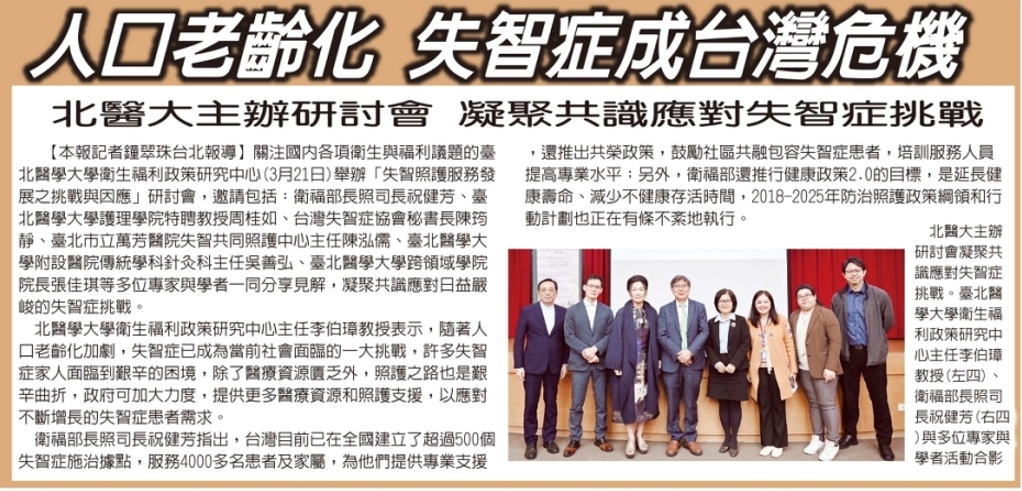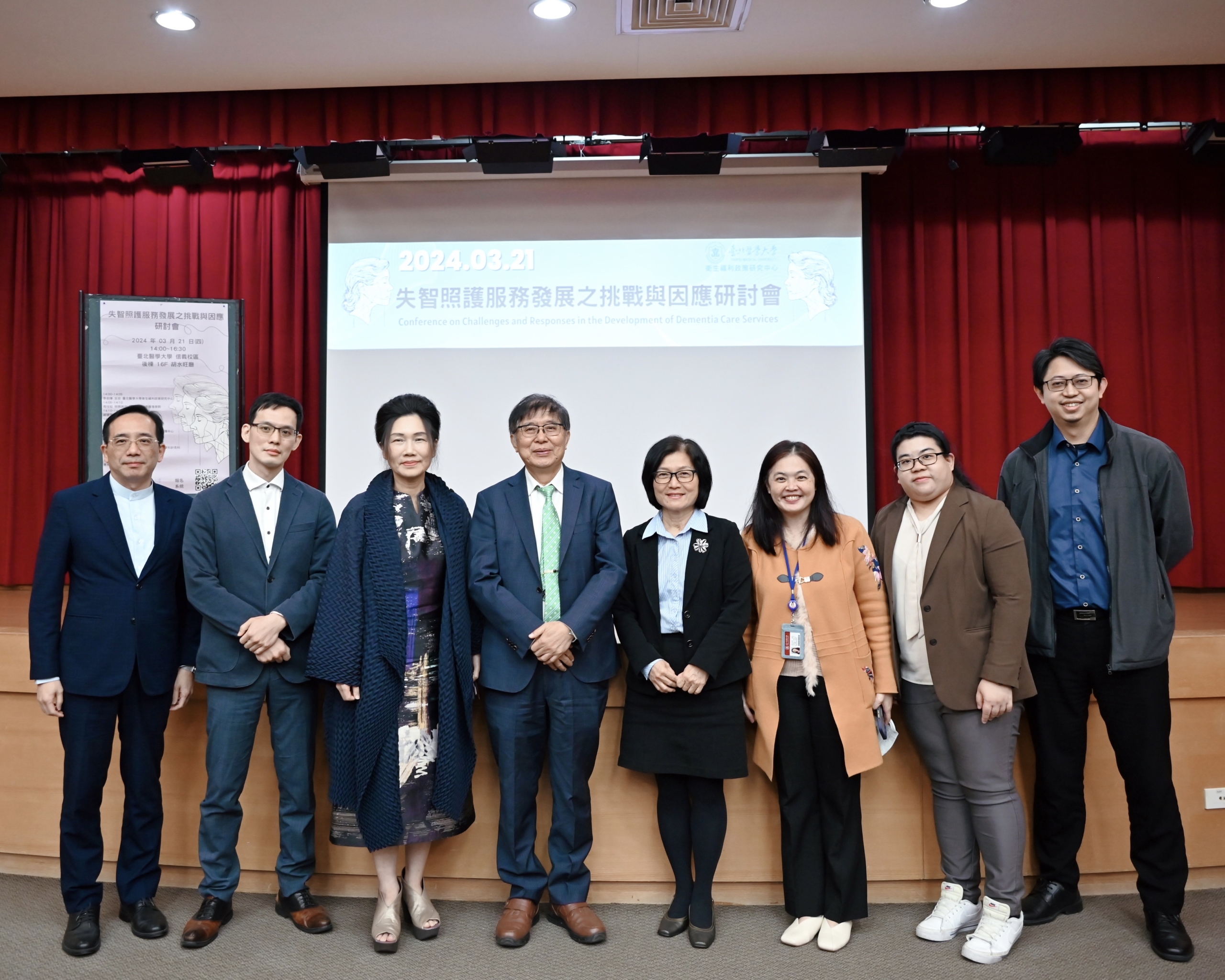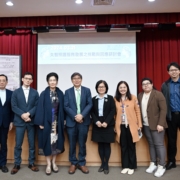【Media Coverage】Taipei Medical University Hosts “Challenges and Responses in Dementia Care Service Development” Seminar, Building Consensus to Address Dementia Challenges.

(民眾日報報導)
On March 21, 2024, the Taipei Medical University Center for Health Policy Research held a seminar titled “Challenges and Responses in Dementia Care Service Development,” where multiple experts and scholars shared their insights, aiming to build consensus in addressing the increasingly severe challenges posed by dementia.

The photo order from left to right:
Director Lee Po-Chang urged attention to the issue of dementia.
In his welcome speech at the Taipei Medical University Center for Health Policy Research, Director Lee Po-Chang expressed that with the aging population, dementia has become a significant challenge in today’s society. Director Lee shared the difficulties faced by families with dementia patients, such as limited medical resources and the arduous path of caregiving. He urged the government to increase efforts in providing more medical resources and caregiving support to meet the growing demands of dementia patients.
Professor Chou Kuei-Ju called for the improvement of relevant regulations and policies.
When speaking at the Taipei Medical University School of Nursing, Professor Chou Kuei-Ju emphasized the importance of improving regulations and policies related to dementia care. She pointed out that Taiwan still has many deficiencies in this area and urgently needs the government to actively revise existing regulations and formulate more comprehensive policies to effectively respond to the increasingly severe situation of aging population and the rising number of dementia patients.
Professor Chou also mentioned the shortage of long-term care manpower and urged the government to strengthen talent training and support policies. Additionally, she expressed great concern for the plight of caregivers’ families and urged the government to consider their needs more and provide more support.
Director Chu Chien-Fang introduced Taiwan’s dementia care policy and planning.
In her speech titled “Taiwan’s Dementia Care Policy and Prospects” at the Ministry of Health and Welfare, Director Chu Chien-Fang elaborated on Taiwan’s relevant policies and plans in the field of dementia care.
Director Chu pointed out that Taiwan has established over 500 dementia treatment centers nationwide, serving more than 4,000 patients and their families, providing them with professional support. At the same time, the government has launched inclusive policies to encourage community inclusion and support for dementia patients, and training service personnel to enhance their professional level.
Furthermore, the goal of Health Policy 2.0 is to extend healthy life expectancy and reduce unhealthy survival time. Director Chu urged the public to pay attention to lifestyle adjustments. The 2018-2025 Preventive Care Policy and Action Plan are also being implemented systematically.
She also mentioned that the government is actively building a dementia-friendly society, raising public awareness, eliminating stigma against dementia, and providing more care and support for patients. The establishment of integrated care networks, emphasis on early intervention, and other important measures require cooperation from all sectors of society to achieve the ideal situation.
Secretary-General Chen Yun-Ching shared the challenges and needs faced by families.
Secretary-General Chen Yun-Ching of the Taiwan Alzheimer’s Disease Association focused on the situation and needs of dementia families. She said that these families face numerous difficulties in caregiving and seeking medical treatment, and family members need to have professional knowledge to deal with multiple diseases. She called on society to provide support and understanding to help them through these difficulties.
Secretary-General Chen pointed out that the arrival of dementia may lead to changes in family structure and division of labor, bringing heavy pressure to family members. She called for mutual support and communication among family members. She stated that the association will continue to provide support and information to dementia families, and hopes that the government, institutions, and the public will work together to create a more friendly and supportive environment for these families.
Dr. Chen Hong-Ru analyzed the challenges faced by metropolitan hospitals.
Dr. Chen Hong-Ru, Director of the Dementia Co-care Center at Taipei Municipal Wanfang Hospital, analyzed the challenges faced by metropolitan hospitals from the perspective of metropolitan hospitals. He believes that inter-departmental communication and coordination are major challenges, and the workload of professionals is increasing, especially in disease certification.
Dr. Chen pointed out that the implementation of education and training still needs to be strengthened, and people need to be taught to internalize theoretical knowledge into practical skills. In addition, issues such as agitation in dementia patients also pose challenges to safety protection. He advocated for providing exclusive consultation spaces and friendly environments for patients to improve the quality of care.
Dr. Wu Shan-Hong shared the role of traditional Chinese medicine in dementia care.
Dr. Wu Shan-Hong, Director of the Traditional Chinese Medicine and Acupuncture Department at Taipei Medical University Hospital, elaborated on the application and role of traditional Chinese medicine (TCM) in dementia care. He introduced various treatment methods such as Chinese herbal medicine and acupuncture, which can effectively improve cognitive function, emotions, hallucinations, and other symptoms in dementia patients, delaying disease progression and improving quality of life.
Dr. Wu emphasized that TCM treatment needs to be tailored to individual circumstances, leveraging its personalized advantages. In addition to hospital treatment, he also called for the establishment of TCM care stations in the community to provide convenient services for patients and their families nearby, and to enhance communication and cooperation between medical staff and patients’ families to achieve comprehensive care.
Dean Chang Chia-Chi introduced the i Support program to empower family caregivers.
Dean Chang Chia-Chi of Taipei Medical University’s Interdisciplinary College highlighted the “i Support” program in her speech, aimed at empowering and supporting family caregivers of dementia patients. With the intensification of population aging, the role of family caregivers is becoming increasingly important. The program helps them better shoulder the responsibilities of caregiving by providing support and training.
Dean Chang stated that the goal of the program is to support and train over 70% of family caregivers of dementia patients by 2025, while also increasing overall societal awareness of dementia. The program provides assistance in the form of online education, resource tools, and includes initiatives such as training promoters and seeking partners for promotion. She called on individuals in society to join efforts to promote the program.
The recommendations from the participating experts have contributed to consensus-building.
The seminar brought together representatives from various sectors including government officials, medical experts, and NGOs, who provided valuable suggestions regarding dementia care services:
- The government should enhance interdepartmental cooperation, improve relevant regulations and policies, strengthen early screening mechanisms for dementia, and increase investment in medical resources.
- Efforts should be made to vigorously develop community care networks to provide more convenient services for patients, and enhance communication and cooperation between medical staff and patients’ families to achieve comprehensive care.
- Support and promote the application of traditional Chinese medicine in dementia care, leveraging its unique role.
- Continuously improve home care support measures to alleviate the pressure on family caregivers.
- Place high importance on the application of technology, and enhance the level of care through smart means.
The consensus among all parties is to promote top-down coordination and multi-party collaboration, rallying social forces to address the significant challenges in dementia care, and creating a favorable medical, health, and living environment for patients and their families.
Population aging has become a major social issue, and the increasing number of dementia patients poses increasingly severe challenges. This requires joint efforts from all sectors of society, through policy support, resource investment, and service guarantees, to provide better medical services, life support, and humane care for patients and their families. Providing dementia patients with a dignified and friendly living environment has become an important livelihood issue and governance priority. We look forward to concerted efforts from the government, medical institutions, NGOs, and other parties to make substantial progress and collectively build a solid line of defense to protect dementia patients.
Media Coverage:
2024/03/21 聯合新聞網 最新失智症調查出爐!國內達35萬人 逾6成伴隨這個症狀
2024/03/22 經濟日報 北醫大失智照護研討會 邀專家獻策



